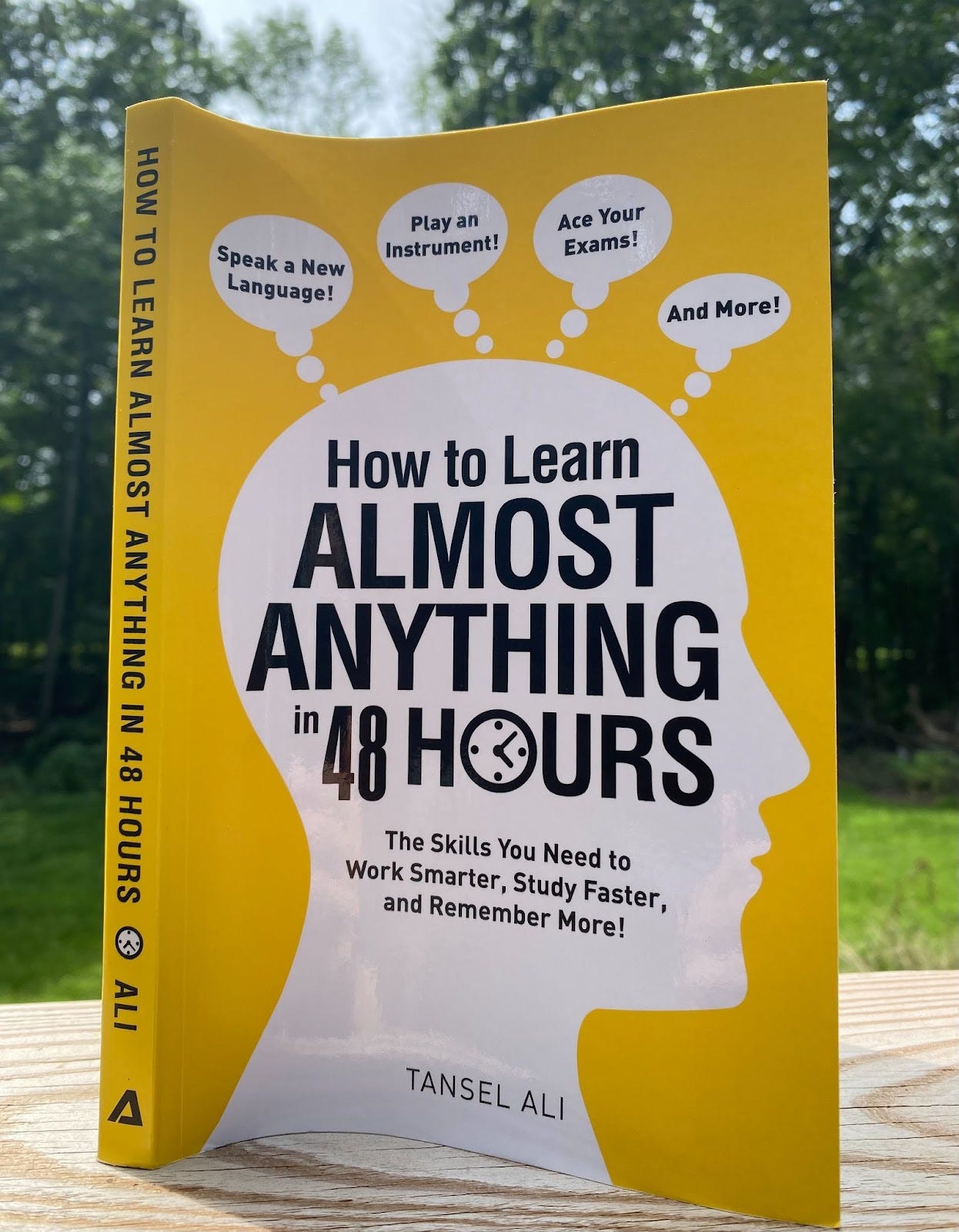How to Learn ALMOST ANYTHING in 48 Hours by Tansel Ali
Modern information times call for modern learning methods.
“For generations, rote learning has been our principal way of remembering things, with repetition the sole focus of our memorization. A more effective way of remembering though, is to use your imagination.” Tansel Ali, author of How to Learn ALMOST ANYTHING in 48 Hours, proposing a new and improved path to education.
What’s the Deal?
In a world where the answers to all of our questions and concerns are only a few clicks away, we find ourselves with the novel issue of managing and sustaining information overflow. We are no longer stranded, wondering how to clean off a rusty grill, train for a 5k, or pass organic chemistry; rather, the modern availability of information has left us wondering how piano lessons, jiu-jitsu moves, history books, fitness podcasts, where we put our keys, and what we ate for breakfast will all fit in our heads. Of course, none of this is a problem if we turn to our handy-dandy technology, where we can document our every thought, capture our every action, and find every fact known to man; however, what happens when these devices are out of reach during a test, useless during a competition, or malfunctioning on your drive home? In his book How to Learn ALMOST ANYTHING in 48 Hours, former memory champion Tansel Ali explains how we can use visualization and memory techniques to enhance our learning, optimize our time, and remember anything we desire. Like many other memory athletes and enthusiasts, Tansel Ali’s philosophies are built on the premise that memory is the cornerstone of cognitive ability, providing the base for all mental and physical tasks. Although he values other factors, such as the ability to apply knowledge and problem-solving, Ali argues that we cannot accomplish any task or problem without remembering the steps, details, and functions necessary to do so. For example, if you cannot memorize phrases and words in a foreign language, how will you be able to string them together with proper tone and context in a conversation? If you don’t remember which key represents which note, how will you play the song? If you don’t remember your name, who you are, or what you are doing, how can you go about your daily life?
In Ali’s eyes, due to inefficient and outdated teaching methods, the process of memorization is the greatest limiting factor to learning amidst the modern world’s abundance of information; consequently, he believes that this field offers the greatest opportunity for improvement. From speed reading to preparing for calculus exams and rehearsing speeches, Ali guides you through time-tested techniques from his career as a memory athlete that will help improve your performance and shortcut your path to learning. Most importantly, Ali outlines how you can apply these techniques to virtually anything, maximizing your time and pushing you closer to your cognitive potential. We may never be able to compute, memorize, or generate as efficiently as a computer, but — until Elon Musk saves us with Neural Link and superhuman intelligence — these memory techniques give us the best chance at optimizing nature’s most powerful machine: the brain.
“We are bombarded by information, meaning we have more to read, more to analyze, more to think about and more to discuss...we need to organize our information better so we can access it faster and more precisely.” - Ali on the role of memory and learning techniques amidst society’s information overload.
My Take
Like many kids, I hated reading all the way from elementary school to high school, much of which I contribute to my reading material spurring from a curriculum, rather than my interests; however, when I entered college, I recognized how reading could satisfy my curiosities, expand my abilities, and give me an edge on my competition if pointed in the right direction. Over time, this epiphany led to weekly Barnes and Noble trips, long study sessions, and leisurely deep-dives, where I found that my interest in reading was no longer the issue; rather, it was my lackluster reading speed that was now holding me back. After digging through YouTube, I came across speed-reading systems and methods I could use to rapidly increase my reading rate and multiply my productivity in the classroom, on the playing field, and in life. Although concepts like speed reading and memorizing hundreds of vocabulary words with visualization might set off B.S. detectors with an exclamation point, I can attest that they work and are worth looking into. Will you suddenly read 1,000 words per minute or complete a semester’s worth of studying in a few days? Probably not, but my experience tells me that you can ramp up your cognitive RPMs by an order of magnitude or two. The most interesting part of all of this is that these tools don’t train you to do anything out of the ordinary, nor do they bend any rules of physics; rather, they put you in a position to utilize the brain’s complex mechanisms to their potential. By leveraging speed reading techniques, visualization methods, and association concepts like those in this book, I have doubled the number of books I can read, traversed daunting pre-med courses, and picked up some neat party tricks, like memorizing a deck of cards in 3 minutes. If you are a student, an avid reader, or anybody looking to enhance your learning, I recommend you invest some time in How to Learn ALMOST ANYTHING in 48 Hours and related resources, as I predict that they will pay back in dividends.
“Knowing what’s needed makes the journey easier.” - Ali alluding to the value of memory.


